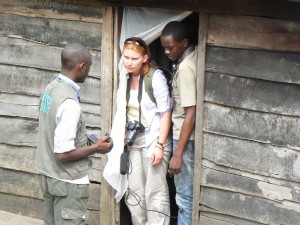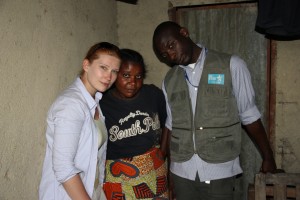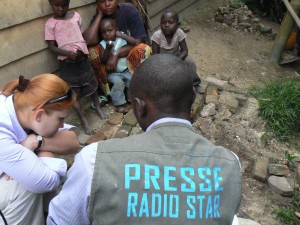Eastern Europe meets Africa
 Take young journalists from Eastern European countries, bring them together with experienced journalists from Africa and give them the chance to produce stories together. That’s East4South in a nutshell but it’s an interesting media project on many levels.
Take young journalists from Eastern European countries, bring them together with experienced journalists from Africa and give them the chance to produce stories together. That’s East4South in a nutshell but it’s an interesting media project on many levels.
The journalists first meet for an initial workshop in Brussels. Here, they discuss their perceptions of each others country and examine intercultural reporting. And, importantly everybody finds a team partner for the reporting trip in Africa.
After one week in Brussels, the participants go back to their respective homes to get ready for the big project. About three months later each team meets in the home country of the African partner and begins producing their TV features, radio reports or articles.
Two participants really clicked together. Christian Katsuve Kamate is from DRC and works for a local radio station in Bukavu. He teamed up with Katarzyna J. Kowalska who is from Poland and works for Polish national television. After their first meeting in Brussels they agreed on a topic for a film: the life of an ex-child soldier, moreover – a female child soldier. For both of them, the work experience left a lasting impression. We caught up with them during their post-production at DW’s studios in Bonn.
Christian, for the first time in your life you’ve collaborated with someone from another country. What was surprising for you about the way Katarzyna works?
Christian: I was surprised and pleased how well she got used to our way of working. Very quickly she understood that we often face a lot of problems that prevent us from working the way she is used to in her country. And Katarzyna was very determined, she never gave up and she also pushed me to insist when we faced problems with interview partners.
Where did you see the biggest differences from working in Poland, Katarzyna?
Katarzyna: Christian had prepared our work in Congo very well and he had all the contacts we needed, but the surprises came anyway. For example, people wanted to meet us prior to the interviews. They wanted to do something like “pre-interviews”. I wasn’t used to this from Poland. Usually, I call people and after that I take my camera and shoot the interview. In Congo things happen much slower than in my country.
What did you learn from Christian?
Katarzyna: Many things! First of all, I tried to learn how to be patient. We were often delayed because of things like electricity cuts, lack of internet, bad roads and so on. Christian kept telling me: “Be patient. It’s not like your country. Things are different here.” I also had to learn many intercultural issues: how to contact people, how to talk to them, and the Congolese way of life. In the beginning I had to observe a lot and I was very happy that I could go as deep as possible into this society. With Christian I also had to learn to depend on another person. Normally, I’m a very independent person but in Congo I had to do everything with Christian, since I don’t the speak French or Kiswahili and most people don’t speak English – I needed him to communicate.
How has your way of working changed from the experience with Katarzyna?
Christian: I don’t give up easily anymore. We have so many problems in Congo that sometimes we just give up and say “I can’t take this anymore.” From Katarzyna I learned that we should try to insist and even disturb people to get what we need.
You did a feature on a female former child soldier. Quite a difficult topic, how did you find the story?
Christian: It was a team decision. Katarzyna and I easily agreed on the same topic, even though we have very different audiences. There have been many reports on boy child soldiers. But I thought that women in my society are not well presented and I really wanted to show how those girls who have been child soldiers live today. What are their problems? And, I was very lucky to find a partner for this project when Katarzyna agreed to do the story.
Why this topic, Katarzyna?
Katarzyna: When I knew that there’s someone from DRC in the East4South group I immediately fixed myself on this country. For me there was no other country that is as interesting as Congo. I really wanted to do something on child soldiers and Christian came up with this specific topic and I loved all his ideas.
Christian, would you recommend East4South to your colleagues?
Christian: Firstly, in this project participants can acquire skills they don’t have. Secondly, you meet people here. You meet colleagues with a completely different background. That is always great! Because when you meet you talk, you exchange, you learn from each other. It totally changed my ideas about Poland. I had Poland with me. And Katarzyna gave me a new vision of her country. This project is not only about technical skills, it can change your stereotypes.
Katarzyna?
Katarzyna: I recommend this project because you learn how to open your mind. This is very important when we live in Europe and we see other countries from our perspective. It’s very important to learn how to see things from a different perspective, like the Congolese perspective. For us Europeans this experience changed our perspective of the world.
Katarzyna and Christian’s film Silent War will be broadcast in both DRC and in Poland.
Silent War from DW Akademie – Africa on Vimeo.
East4South is a DW-Akademie project funded by the European Union. If you’re interested in participating in the next round of East4South, keep checking the project website and our blog.







Feedback